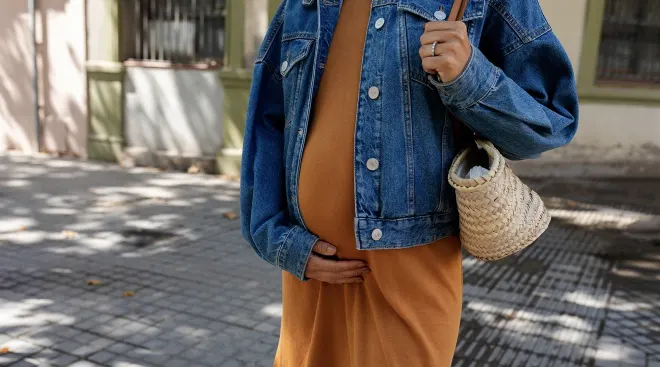- Cheers—you’ve officially made it to the halfway point of pregnancy! It might feel like time is crawling or time is flying; it depends on how you’re feeling and coping with all the changes happening to you and around you.
- The anatomy scan—or 20-week ultrasound—will be happening soon! Yes, you can find out baby’s sex at this appointment (if you want). More importantly, an ultrasound tech will look at baby’s organs, take measurements and assess that baby is developing appropriately.
- Your doctor or midwife will probably start measuring your fundal height soon. Essentially, they’ll measure your bump which is definitely starting to pop!
- You’ve probably gained about 10 pounds—give or take—at this point. Don’t get too caught up in the number; make sure you’re eating a healthy, balanced diet and getting some movement!
If you’ve recently found out baby’s sex, you’re in a completely new mindset—are we right? Things are suddenly feeling very real. Get ready—before you know it, you’ll be welcoming your little boy or girl!
Some moms-to-be at this point wonder: Is baby fully developed at 20 weeks? Your 20-week fetus has come a long way but still has plenty of developing left to do at the halfway point in your pregnancy. There are a couple of important growth steps taking place around this time: A 20-week fetus has working taste buds and should have the sucking reflex—you may even catch baby sucking their thumb on the next ultrasound! They’re gulping down several ounces of amniotic fluid each day—that's significantly more than before. Plus, regular sleep/wake cycles start taking shape. And when baby is awake, you’ll know it because they’ll probably be more active. That new, fluttering feeling in your stomach—called the quickening—is your baby saying hello!
Baby’s muscles are growing at a fast clip right now—and all those new muscles need practice to strengthen and coordinate, hence all that punching and kicking. As those muscles work with the nervous system, including the brain, baby will be able to make increasingly coordinated and intentional movements.
How big is baby at 20 weeks?
At 20 weeks pregnant, baby is the size of a banana. They weigh between 9 and 10.2 ounces and measure between 6.5 to 8 inches from crown to rump. (Starting next week, baby will be measured from head to toe.) Baby's still got a lot of growing to do but has an excellent start!
What does baby look like at 20 weeks in the womb?
Truth be told, they may look a little gaunt, because baby fat still hasn’t developed all that much at this point. At 20 weeks, baby’s delicate skin stays protected while in the amniotic fluid, thanks to lanugo (fine, light hair) and vernix (a slick, white substance) covering baby’s body.
In addition to tiny fingernails, baby’s fingerprints are taking shape this week. No two people—even identical twins—have the same fingerprints. Fingerprints never change; even if you hurt your finger pads, your fingerprints will come back after your skin repairs itself (although possibly with a scar). These ridges begin forming around the 10th week of pregnancy, when the growth of the middle (basal) layer of skin outpaces the skin on top of it, causing it to fold and buckle on the surface. The unique pattern that emerges is thought to be a combination of genetics (you and baby probably have some pattern similarities) and environment (i.e., influenced by substances in the womb).
20 weeks pregnant is how many months?
Your stage in pregnancy is usually referred to by week, not month, but 20 weeks pregnant is five months pregnant. Because pregnancy is 40 weeks long, you’ve now hit the halfway point!
20 week ultrasound
If you haven’t already had your mid-pregnancy ultrasound, you will very soon, since this prenatal test happens between weeks 18 and 22. This is a detailed ultrasound—you’ll see parts of baby you might not have dreamed possible, including the chambers of their heart, the kidneys, the brain hemispheres and even the sex organs—which means if you haven’t learned baby’s sex yet, you may be able to find out during the 20-week ultrasound (if you’d like). The technician and OB will look to see that everything seems to be developing properly and that baby’s growth is on track for a 20-week fetus.
If you’re 20 weeks pregnant with twins, the ultrasound technician will check to see if babies’ weights are approximately the same size. If they aren’t, more measurements will be taken to be sure neither twin is having growth problems.
Ask for printouts of the sonogram photos. These are wonderful keepsakes of your rapidly developing baby. How cute is that little nose?!
So what should you be feeling at 20 weeks pregnant? Making it to 20 weeks pregnant probably feels pretty darn good. Your first trimester is under your belt, and your energy levels may be rebounding, making you feel stronger. Plus, increased estrogen and progesterone hormones can mean your sex drive is high, and as long as your partner is up for it too, things are probably happening between the sheets. Of course, it wouldn’t be pregnancy if you weren’t dealing with some annoying symptoms. After all, your body is hard at work. Right now, those symptoms likely include swelling, heartburn, leg cramps and a few other things. Here are some of the typical 20 weeks pregnant symptoms you may experience:
Vaginal discharge
You can expect the discharge to keep increasing until delivery, a direct result of heightened hormone levels. But let your doctor know if the discharge is yellow, green or foul smelling.
Leg cramps
Do stretches regularly, and drink plenty of water to prevent your legs from cramping.
Heartburn and/or indigestion
As baby starts to crowd your digestive system, it might not work exactly as it did pre-pregnancy. Watch what you’re eating if you’ve got heartburn or an upset stomach—acidic and spicy foods can cause tummy troubles.
High energy
Enjoy this energy (and libido) surge while it lasts! You might find yourself more fatigued in the third trimester.
Swelling
Don't worry unless the swelling is sudden or severe. Mild swelling is normal and should subside after delivery. In the meantime, put up your feet whenever you can.
Shortness of breath
As your uterus expands, it pushes against your lungs, causing you to feel short of breath. You might find this to be especially true if you’re 20 weeks pregnant with twins. Don’t push yourself too hard, and sit down and rest if you feel yourself gasping for air.
Starting around 20 weeks pregnant, your doctor will measure fundal height at each prenatal visit. Fundal height is the distance from the pubic bone to the top of your uterus. In centimeters, the fundal height should match your week of pregnancy, give or take 2 centimeters. So, for example, your 20 weeks pregnant belly should measure around 18 to 22 centimeters. It should continue to increase about a centimeter each week. A higher or lower fundal height could be the sign of a pregnancy condition, such as gestational diabetes, a growth issue or a breech baby, so if it doesn’t appear to be average, further testing may be necessary.
Curious as to where baby is at 20 weeks in your stomach? Your body is making room for the uterus to expand up towards your belly button, giving baby room to wiggle around. They still have plenty of time to get into the head-down birth position, which doesn’t occur until the third trimester.
At 20 weeks pregnant, weight gain is happening slowly yet surely. You may have gained around 10 pounds by now. Remember: You’re aiming to gain about half a pound to 1 pound per week.
Recommended pregnancy weight gain for moms of normal BMI is about 25 to 35 pounds. If you began pregnancy with a high BMI, your OB will likely advise that you gain somewhere between 11 and 25 pounds. If you were at a low BMI, 28 to 40 pounds will likely be the recommendation.
If you’re 20 weeks pregnant with twins or other multiples, don’t stress too much over your fundal height measurements—it’s harder to say what’s average for moms-to-be carrying multiples. Instead, your OB will likely put more emphasis on your weight gain. Now that you’re 20 weeks pregnant with twins, you should aim to put on slightly more weight each week. In the first half of a twin pregnancy, the recommendation is about 1 pound per week, and in the second half, it’s about 1 to 2 pounds. That’s because healthy weight gain is gradual. Most OBs advise that twin moms-to-be of normal BMI gain about 37 to 54 pounds total during pregnancy.
Finally! Your lower abdomen is starting to look more like a true baby bump—not just bloating and gas. Fetal movement may still be subtle but is increasing in strength. Most women are feeling rejuvenated. Enjoy this sweet-spot time and be proud of surviving–gracefully (or not)–the first half of pregnancy.
Twenty weeks down! You’re at the midway point. Here’s how you can prioritize your health and wellness in your second half of pregnancy.
Use your energy
While you’ve got the stamina, get things done in advance of your third trimester. Put together a birth plan, figure out what you need for the nursery and make other preparations. Be sure to get plenty of sleep!
Decide where you’ll give birth
If you’re planning to have your baby at a hospital, now is a good time to schedule a tour of the maternity wing. While you’re there, check out the classes that may be offered on childbirth techniques, lactation, breastfeeding, infant care and other topics. If you want to give birth at home, you’ll need to find a midwife and discuss your options with your OB.
Learn about Braxton Hicks contractions
These contractions may take you by surprise if you’ve never experienced them. They can feel uncomfortable but don’t last long. You’re not going into labor with Braxton Hicks, but if you start to feel pain and the contractions don’t stop, see your doctor—they could be a sign of something else.
Frequently Asked Questions
How much does a 20 week fetus sleep?
By about 20 weeks of pregnancy, you’ve likely started to feel baby’s movements—especially after a meal (due to a bump in blood sugar) and in the evening and throughout the night. You might be wondering: Is your baby sleeping the rest of the time? It’s hard to know for sure exactly how much babies sleep while they’re still in the womb, especially this early on. But scientists can estimate by looking at things like their heart rate and eye and mouth movements. Researchers have found that fetal sleep cycles develop in the second half of pregnancy, with studies suggesting that both quiet and rapid eye movement (REM) sleep are detectable by the third trimester of pregnancy. By some estimates, a 38-week-old fetus is asleep for 95 percent of the day.
How can I relieve itchy skin during pregnancy?
Add dry, itchy skin to the list of pregnancy complaints. In most cases, mildly scratchy skin is normal, especially on your bump and legs. It’s possibly due to pregnancy hormones and rapidly stretching skin. (Just be sure to let your provider know if your hands or feet itch, or if you itch a lot more at night, which could signal a more serious condition). Your best bet to ease the itching is to wear loose-fitting, comfortable clothes in natural and soft materials (think: cotton). Taking a cool shower or bath and using a gentle, unscented moisturizer on irritated skin may also help.
Does heartburn mean baby's growing hair?
It feels too weird to be true, but there actually is some evidence that a bad case of heartburn might mean baby will be born with a mop-top. One relatively small 2006 study surveyed 64 women and found that those who reported moderate to severe heartburn gave birth to babies with more hair, compared to women who had little to no heartburn in pregnancy. The authors suggest that the same hormone that relaxes the esophageal sphincter—which causes acids to rise from the stomach, leading to heartburn—is also responsible for baby’s hair growth. Keep in mind, lots of women have some heartburn during pregnancy—especially later on, as your growing baby bump pushes up on your stomach.
Why should you sleep on the left side in pregnancy?
Your bump is big enough at this point to put pressure on the artery and vein shuttling blood between your heart and your abdomen (including to baby). Side-lying reduces the weight on important blood vessels. Wake up on your back? Don’t stress—just flip back to your side. If you can’t get comfortable, try putting a pillow between your legs and/or under your bump.
What is the linea nigra?
Don’t be startled if you notice a dark line running from your belly button down to your pelvis (and possibly up your abdomen a bit, as well). This “black line,” from Latin, is probably due to hormones churned out by the placenta during pregnancy, which increase the body’s production of melanin, the substance that gives skin its color. (It’s the same hormone responsible for darkening your nipples.) In general, the darker the color of your skin, the more noticeable your linea nigra may be.
Hitting the 20-week mark felt huge. The first half of pregnancy was so hard for me, and I was excited to be on the other side. Of course, the second half didn't come without its challenges, but knowing I was halfway to meeting baby definitely helped.
Please note: The Bump and the materials and information it contains are not intended to, and do not constitute, medical or other health advice or diagnosis and should not be used as such. You should always consult with a qualified physician or health professional about your specific circumstances.
American College of Obstetricians and Gynecologists, How Long Does Pregnancy Last?, October 2020
Cleveland Clinic, 20-Week Ultrasound (Anatomy Scan), April 2022
Ultrasound, Ultrasound surveillance in twin pregnancy: An update for practitioners, November 2018
Cleveland Clinic, Fundal Height, January 2022
American College of Obstetricians and Gynecologists, How Much Weight Should I Gain During Pregnancy?, August 2021
Psychological Science, Flavor Sensing in Utero and Emerging Discriminative Behaviors in the Human Fetus, September 2022
Akron Children’s Hospital, Confessions of Prenatal Ultrasound Techs, February 2022
Cleveland Clinic, Amniotic Fluid, June 2022
Johns Hopkins Medicine, The Second Trimester
Cleveland Clinic, Quickening in Pregnancy, April 2022
American Pregnancy Association, 20 Weeks Pregnant
American Pregnancy Association, 21 Weeks Pregnant
Ultrasound in Obstetrics and Gynecology, Normal Values for Fetal Abdominal Subcutaneous Fat From 20 to 40 Weeks Gestation, Measured Using Speckle Reduction Software, August 2008
Mayo Clinic, Pregnancy Week by Week: Fetal Development: The 1st Trimester, June 2022
Cleveland Clinic, Lanugo, March 2022
American Pregnancy Association, Fatigue During Pregnancy
Journal of Clinical Medicine, Changes in Sexual Desire in Women and Their Partners During Pregnancy, February 2020
American Pregnancy Association, Swelling During Pregnancy
Cleveland Clinic, Heartburn During Pregnancy, January 2021
Mayo Clinic, Pregnancy Week by Week: What Causes Leg Cramps During Pregnancy, and Can They be Prevented?, April 2023
Mayo Clinic, Pregnancy Week by Week: Second Trimester Pregnancy: What to Expect, March 2022
Mayo Clinic, Preeclampsia, April 2022
Harvard Health Publishing, Shortness of Breath in Pregnancy
Maternal Fetal Medicine Associates, Twin Pregnancy and Fundal Height, April 2023
Centers for Disease Control and Prevention, Weight Gain During Pregnancy, June 2022
American Pregnancy Association, Twins Pregnancy Symptoms
American College of Obstetricians and Gynecologists, Sample Birth Plan Template, January 2021
University of Pennsylvania Health System, Questions to Ask on Your Hospital Tour
Mayo Clinic, Home Birth: Know the Pros and Cons, July 2022
National Institute of Medicine, Braxton Hicks Contractions, August 2023
Cleveland Clinic, Braxton Hicks Contractions, May 2022
StatPearls, Fetal Movement, February 2023
National Library of Medicine, A study on the association between eye movements and regular mouthing movements (RMMs) in normal fetuses between 24 to 39 weeks of gestation, 2020
International Journal of Biological Sciences, Neurophysiologic Measurement of Continuity in the Sleep of Fetuses during the Last Week of Pregnancy and in Newborns, December 2008
Stanford Medicine Children’s Health, Fetal Movement Counting
NHS, Itching and intrahepatic cholestasis of pregnancy
Birth, Pregnancy folklore revisited: the case of heartburn and hair, December 2006
Health University of Utah, Heartburn and Infant Hair
Nemours Kids’ Health, How Can I Deal With Heartburn During Pregnancy?, January 2024
National Institute of Health, Science Update: Sleeping position during early and mid pregnancy does not affect risk of complications, NIH-funded study suggests, September 2019
Cleveland Clinic, Linea Nigra, July 2022
Learn how we ensure the accuracy of our content through our editorial and medical review process.
Navigate forward to interact with the calendar and select a date. Press the question mark key to get the keyboard shortcuts for changing dates.
















































